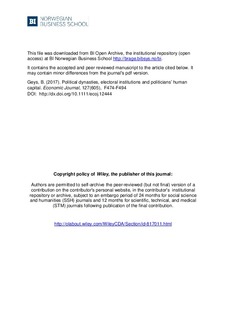| dc.contributor.author | Geys, Benny | |
| dc.date.accessioned | 2016-07-20T13:15:58Z | |
| dc.date.accessioned | 2017-11-03T09:06:09Z | |
| dc.date.available | 2016-07-20T13:15:58Z | |
| dc.date.available | 2017-11-03T09:06:09Z | |
| dc.date.issued | 2017 | |
| dc.identifier.citation | Economic Journal, 2017, 127(605), F474-F494 | nb_NO |
| dc.identifier.issn | 1468-0297 | |
| dc.identifier.issn | 0013-0133 | |
| dc.identifier.uri | http://hdl.handle.net/11250/2463890 | |
| dc.description | The accepted and peer reviewed manuscript to the article | nb_NO |
| dc.description.abstract | This article focuses on political dynasties’ potential consequences, and particularly investigates whether and when they lead to the selection of dynastic politicians with relatively lower education levels. I exploit the different electoral constraints faced by distinct subsets of Italian local politicians to identify whether weaker constraints on political selection processes induce the selection of dynastic politicians with lower education levels relative to their non-dynastic peers. The analysis – which covers almost 540,000 Italian local politicians active during the period 1985–2012 – indicates that a political selection process controlled by politicians rather than the electorate favours dynastic individuals with relatively lower levels of education. | nb_NO |
| dc.language.iso | eng | nb_NO |
| dc.publisher | Wiley | nb_NO |
| dc.title | Political Dynasties, Electoral Institutions and Politicians’ Human Capital | nb_NO |
| dc.type | Journal article | nb_NO |
| dc.type | Peer reviewed | nb_NO |
| dc.date.updated | 2016-07-20T13:15:58Z | |
| dc.description.version | acceptedVersion | nb_NO |
| dc.source.journal | Economic Journal | nb_NO |
| dc.identifier.doi | http://dx.doi.org/10.1111/ecoj.12444 | |
| dc.identifier.cristin | 1368815 | |
| dc.description.localcode | 2, Forfatterversjon | nb_NO |
